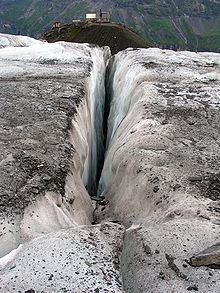Fumigation
The term depletion is understood to mean the melting of the snow and ice cover , so that the ground underneath emerges in whole or in part. The term comes from alpinism and is mainly used in descriptions of paths and conditions in high mountain regions . So one speaks z. B. also from aperen mountain flanks, peaks or glaciers , in cases where the depletion is already well advanced.
The term aper ( Old High German : abar ) also simply means “free of snow”, “without snow” as the opposite of “snow-covered”.
Dangers of naturalization
- On many mountain slopes, loose scree is held together by snow and ice ( permafrost ). By snow melt this mountain slopes wanes stop giving ice and snow, causing it to rock falls and landslides may occur. Due to the increasing global warming this problem is exacerbated e.g. B. in the Alps more and more, so that many routes are no longer accessible in summer.
- In very strong ausgeaperten (aperen) glaciers are almost all crevasses free as the snow bridges are melted in between. This makes it much easier to see gaps, which often leads to carelessness. However, bridges that were previously thicker than average may still be left over. With prolonged heat and the associated erosion, the thickness and stability of these bridges decrease drastically, which can lead to crevasse falls.
literature
- Mathias F. Vuille: On the spatiotemporal dynamics of snowfall and depletion in the area of the southern Altiplano, South America . Ed .: Geographical Institute of the University of Bern. Arbeitsgemeinschaft Geographica Bernensia, Bern 1996, ISBN 3-906151-02-6 .
Web links
Wiktionary: aper - explanations of meanings, word origins, synonyms, translations
